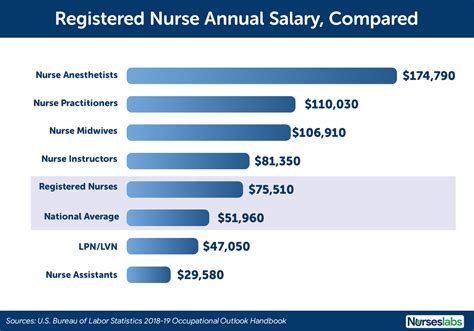Intro
Discover the average anesthesia nurse salary and factors influencing their earnings. Learn about certified registered nurse anesthetist (CRNA) pay, salary ranges, and growth prospects in this specialized field. Get insights on anesthesia nurse salary variations by location, experience, and industry, and explore the benefits and demands of this high-paying nursing career.
The field of nursing is a rewarding and challenging career path that offers numerous specializations, each with its unique set of responsibilities and compensation. Among these specializations, anesthesia nursing stands out as a high-paying and in-demand career. Anesthesia nurses, also known as Certified Registered Nurse Anesthetists (CRNAs), play a crucial role in ensuring patient safety and comfort during medical procedures. In this article, we will delve into the world of anesthesia nursing and explore the average salary ranges, factors that influence compensation, and the benefits of pursuing a career in this field.

What is an Anesthesia Nurse?
Anesthesia nurses are advanced practice registered nurses (APRNs) who specialize in the administration of anesthesia to patients undergoing surgical, medical, or other procedures. They work closely with anesthesiologists, surgeons, and other healthcare professionals to ensure that patients receive safe and effective anesthesia care. Anesthesia nurses are responsible for assessing patients before, during, and after procedures, administering anesthesia, and monitoring patients' vital signs and anesthesia levels.
How Much Do Anesthesia Nurses Make?
The salary of anesthesia nurses can vary depending on factors such as location, experience, education, and type of employer. According to the Bureau of Labor Statistics (BLS), the median annual salary for nurse anesthetists was $181,040 in May 2020. However, salaries can range from $140,000 to over $250,000 per year, depending on the specific circumstances.
Here are some average salary ranges for anesthesia nurses in the United States:
- Entry-level (0-2 years of experience): $140,000 - $170,000 per year
- Mid-level (2-5 years of experience): $170,000 - $200,000 per year
- Senior-level (5-10 years of experience): $200,000 - $230,000 per year
- Executive-level (10+ years of experience): $230,000 - $250,000 per year
Factors That Influence Anesthesia Nurse Salaries
Several factors can influence the salary of anesthesia nurses, including:
- Location: Salaries can vary significantly depending on the location. Cities with a high cost of living, such as New York or San Francisco, tend to offer higher salaries to compensate for the increased expenses.
- Experience: More experienced anesthesia nurses can command higher salaries, as they have developed a higher level of expertise and can take on more complex cases.
- Education: A master's degree or doctoral degree in nurse anesthesia can lead to higher salaries and greater job opportunities.
- Employer: Salaries can vary depending on the type of employer, such as hospitals, clinics, or private practices.

Benefits of Pursuing a Career in Anesthesia Nursing
Pursuing a career in anesthesia nursing can offer numerous benefits, including:
- High salary potential: Anesthesia nurses are among the highest-paid nursing professionals, with median salaries exceeding $180,000 per year.
- Job security: The demand for anesthesia nurses is high, and the field is expected to continue growing in the coming years.
- Variety: Anesthesia nurses work with patients of all ages and backgrounds, and are involved in a wide range of medical procedures.
- Personal satisfaction: Anesthesia nurses play a critical role in ensuring patient safety and comfort, which can be highly rewarding.
How to Become an Anesthesia Nurse
To become an anesthesia nurse, you will need to complete the following steps:
- Earn a Bachelor's Degree in Nursing: The first step to becoming an anesthesia nurse is to earn a Bachelor's Degree in Nursing (BSN).
- Gain Experience: Most anesthesia nurse programs require applicants to have at least one year of experience in a critical care setting.
- Earn a Master's Degree in Nurse Anesthesia: Anesthesia nurses must earn a Master's Degree in Nurse Anesthesia (MSN) from an accredited program.
- Obtain Certification: After graduating from an anesthesia nurse program, you will need to obtain certification from the National Board of Certification and Recertification for Nurse Anesthetists (NBCRNA).
- Maintain Certification: To maintain certification, anesthesia nurses must complete continuing education requirements and adhere to the NBCRNA's recertification guidelines.

Conclusion
Anesthesia nursing is a rewarding and challenging career that offers high salaries and job security. If you are considering a career in anesthesia nursing, it is essential to research the salary ranges, factors that influence compensation, and the benefits of pursuing a career in this field. By following the steps outlined above, you can become a certified anesthesia nurse and start a rewarding career in this exciting field.
What is the average salary for an anesthesia nurse?
+The average salary for an anesthesia nurse is around $181,040 per year, according to the Bureau of Labor Statistics (BLS).
What factors influence anesthesia nurse salaries?
+Factors that influence anesthesia nurse salaries include location, experience, education, and type of employer.
How do I become an anesthesia nurse?
+To become an anesthesia nurse, you will need to earn a Bachelor's Degree in Nursing, gain experience, earn a Master's Degree in Nurse Anesthesia, obtain certification, and maintain certification.
